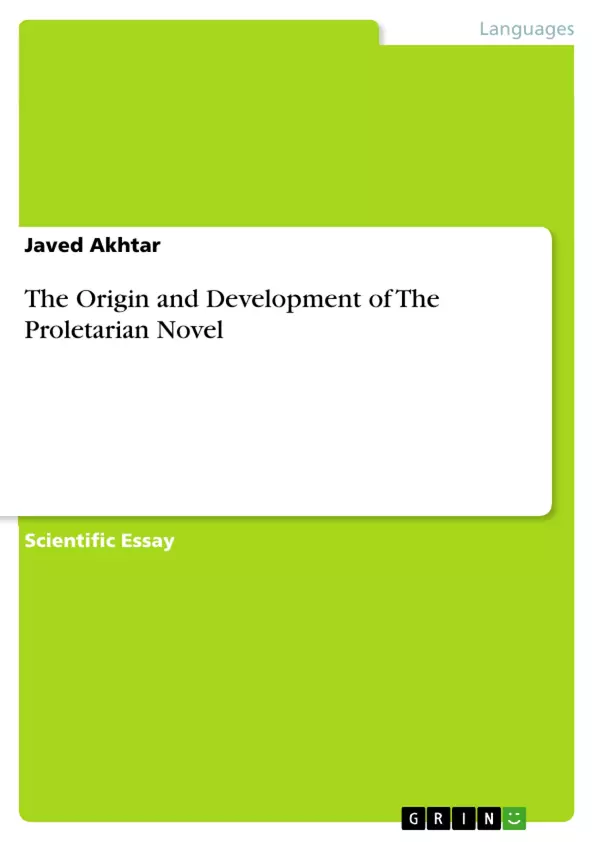This research paper intends to trace the origin and development of the mature proletarian revolutionary novel. The mature revolutionary proletarian novels will be discussed and highlighted in this study in terms of Marxist hermeneutics. This new literary kind did not come into being prior to the imperialist era because the socioeconomic requirements for this literary genre were non-existent and the proletarian movement did not enter into its decisive historical stage of development.
This new genre of the novel appeared simultaneously in the works of Robert Tressell, Martin Anderson Nexo, Upton Sinclair and Maxim Gorky in the beginning of the twentieth century. In this era of imperialism, the proletarian novel came into existence, when the socio-historical ethos brought the proletarian movement into being as well as helped to organise and develop it on international level.
At the end of this analytical and comparative study of them, the noticeable point is that the proletarian novels of that period share astonishing similarities with one another. Applying Marxist literary hermeneutics to the art of novel writing of the famous proletarian novelists, this research paper will try to introduce new portrait of the personages of the novels of these proletarian novelists in an innovative perspective.
Frequently asked questions
What is "The Origin and Development of the Proletarian Novel" about?
"The Origin and Development of the Proletarian Novel" appears to be an academic paper analyzing the evolution of the novel, focusing on the emergence and characteristics of the proletarian novel. It traces the novel's origins from early forms to its development in different historical periods and national literatures, specifically highlighting the socio-economic conditions that influenced its evolution.
What are some of the key literary works mentioned?
The text discusses a wide range of novels and literary works from various periods and regions, including:
- Early novel forms like "El Caballero Cifar," "The Amadis de Gaula."
- Works of Cervantes, Boccaccio, Chaucer, Rabelais.
- 18th-century novelists like Defoe, Richardson, Fielding, Smollett, Sterne.
- 19th-century novelists like Dickens, Gaskell, Hugo, Balzac, Stendhal, Zola, Dostoevsky, Tolstoy.
- Later proletarian novelists like Robert Tressell, Martin Anderson Nexo, Upton Sinclair, and Maxim Gorky.
Which authors and critics are cited in this analysis?
The author references several literary critics and theorists, including Mikhail Bakhtin, Arnold Kettle, Raymond Williams, Georg Lukács, Fredric Jameson, and others. These citations are used to support the arguments about the novel's development and its relationship to social and economic contexts.
What historical periods are discussed?
The paper spans a broad historical range, examining the novel's development from ancient times through the Renaissance, the 18th century, the 19th century, and into the early 20th century (the age of imperialism), emphasizing how specific historical conditions influenced the novel's form and content.
What is the main argument about the "mature proletarian novel"?
The central argument seems to be that the "mature proletarian novel" emerges in the age of imperialism, characterized by a class-conscious perspective and a focus on the struggles of the international proletariat. Robert Tressell's "The Ragged Trousered Philanthropists" is identified as the first example, with works by Martin Anderson Nexo, Upton Sinclair, and Maxim Gorky further developing this genre.
What are some of the key themes explored in the text?
Key themes include:
- The social and economic origins of the novel.
- The relationship between literature and society.
- The portrayal of class struggle in the novel.
- The development of proletarian consciousness.
- The influence of Marxist thought on the novel.
- Realism in the portrayal of the working class.
What are the key words provided in this language preview?
Based on texts provided above, these are key words:
- Origin
- Development
- Proletarian
- Novel
- Capitalism
- Socialism
- Bourgeoisie
- Proletariat
- Realism
- Arbeit zitieren
- Javed Akhtar (Autor:in), 2016, The Origin and Development of The Proletarian Novel, München, GRIN Verlag, https://www.grin.com/document/337563



